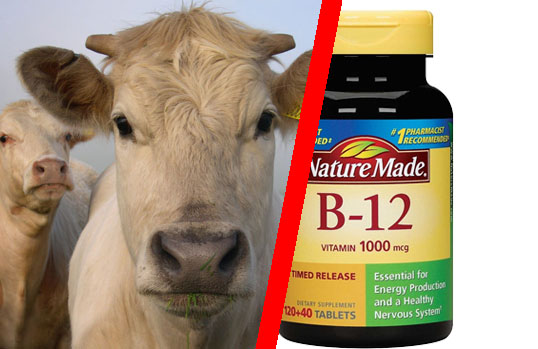
Marc Resch
|
|
|||||||||||||
|
| ||||||||||||||
|
| ||||||||||
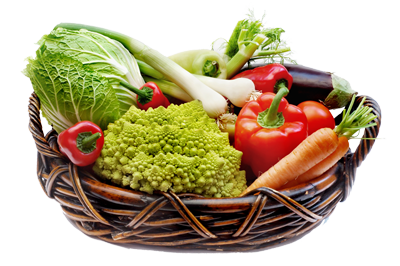
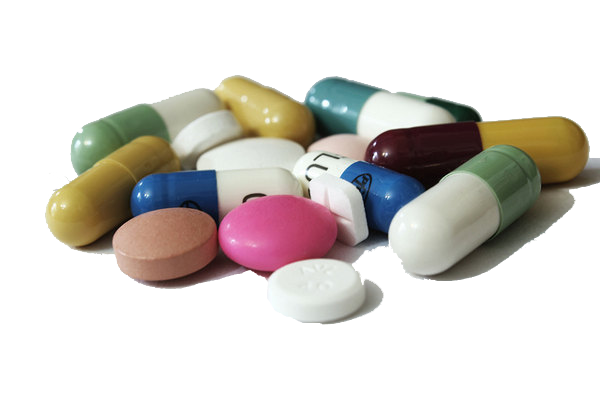
Reconnect oneself to Nature,
| ||||||||||
 |
|
It seems clear for the authors of this document that no vegetable food is "reliable". And the acute deficiency in B12 vitamin provokes severe symptoms that are described at length in this document, to show how serious is the subject.
"Most vegans consume enough B12 to avoid anemia and nervous system degradation, but many don't consume enough to avoid potential risks of heart diseases and complications of pregnancy."
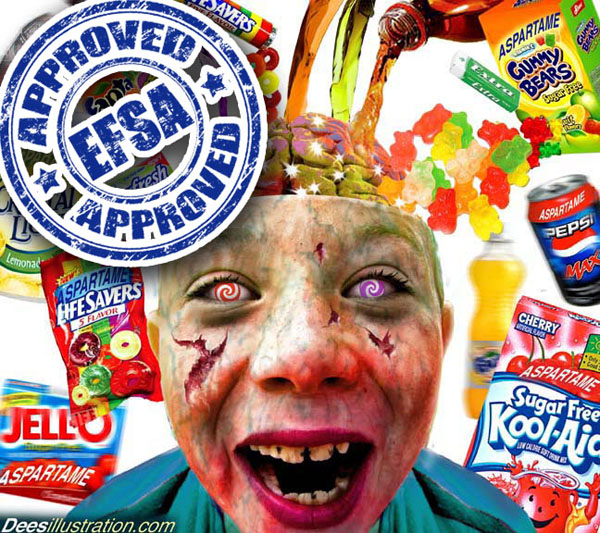 It is surprising at the extreme to see that on one side the European Union funds an organism that warns against potential risks of heart diseases and complications of pregnancy that might be perhaps happening to a part of the small vegan population, and on the other side the same European Union allows in food, at huge doses and for the entire population, highly harmful substances that are well known for their pathogenicity, especially on heart, brain, gestation and cancer promotion, as aspartame, monosodic glutamate, and numerous other food additives, margarine, mineral oil, etc. The European Union, with TAFTA and numerous regulations that are beyond any democratic decision, offers a friendly welcome in food to pesticides, pollutants, plastics, PCBs and endocrine disruptors, and to all GMOs whose toxicity and numerous misdeeds on environment have been largely proven, moreover hiding their presence by allowing to label "GMO free" the products containing it less than 1%. The European Union, who has once more declared in 2012 that aspartame presents no risks for health, oddly warns us with great certainty against a supposed highly serious risk that vegans would take if they do not consume supplements.
It is surprising at the extreme to see that on one side the European Union funds an organism that warns against potential risks of heart diseases and complications of pregnancy that might be perhaps happening to a part of the small vegan population, and on the other side the same European Union allows in food, at huge doses and for the entire population, highly harmful substances that are well known for their pathogenicity, especially on heart, brain, gestation and cancer promotion, as aspartame, monosodic glutamate, and numerous other food additives, margarine, mineral oil, etc. The European Union, with TAFTA and numerous regulations that are beyond any democratic decision, offers a friendly welcome in food to pesticides, pollutants, plastics, PCBs and endocrine disruptors, and to all GMOs whose toxicity and numerous misdeeds on environment have been largely proven, moreover hiding their presence by allowing to label "GMO free" the products containing it less than 1%. The European Union, who has once more declared in 2012 that aspartame presents no risks for health, oddly warns us with great certainty against a supposed highly serious risk that vegans would take if they do not consume supplements."If by chance you decide not to use enriched products or supplements, realize that you undertake a dangerous experiment that others have tried well before, with a constantly low rate of success."
To help Nature, take supplements
At the end, the speech adopts an attitude in favor of Nature and environmentalism. Help Nature by being vegan, but then you absolutely have to consume artificial supplements produced in pharmaceutical plants from GM bacterias, packed in chemicals, wrapped in plastic and sent everywhere in the world with great expense of oil. All of this would be really necessary so that we, frugivorous humans, could at last allow ourselves to stop eating animals?"The abomination of modern livestock industry tending to reduce living sensitive beings to simple machines is nothing natural. By choosing enriched food or B12 supplements, vegans have this vitamin without causing any harm to sensitive beings nor damages to the environment. Their source of B12 is the same as for all animals living on this planet: microorganisms."This paragraph is of a mind-blowing Orwellian anti-truth: against artificial meat, natural supplements. Artificial supplements are equivalent to natural sources, they do no harm to the environment, and all animals on Earth benefit from these natural sources: three nice thoughts, three lies.
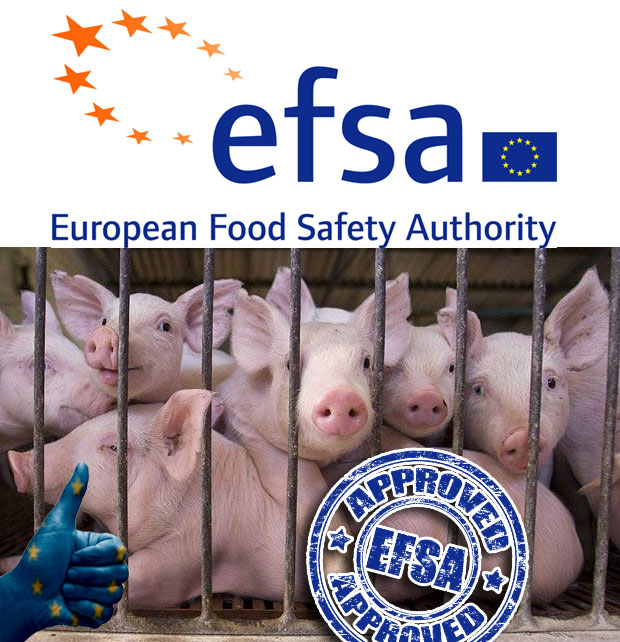 Livestock animals are largely supplemented in vitamins and minerals, so far that virtually all B12 vitamin contained in meat comes from pharmaceutical plants. Production, wrapping and sending of dietary supplements generates pollution and waste, and they are also nothing "natural". But moreover, the form of B12 vitamin put forward by the European Union and vegan associations, and largely given to livestock animals, is cyanocobalamin, an artificial form of B12 vitamin that doesn't exist in Nature, and which is usually produced by genetically modified bacterias.
Livestock animals are largely supplemented in vitamins and minerals, so far that virtually all B12 vitamin contained in meat comes from pharmaceutical plants. Production, wrapping and sending of dietary supplements generates pollution and waste, and they are also nothing "natural". But moreover, the form of B12 vitamin put forward by the European Union and vegan associations, and largely given to livestock animals, is cyanocobalamin, an artificial form of B12 vitamin that doesn't exist in Nature, and which is usually produced by genetically modified bacterias.It is absolutely amazing to see that on one side the European Union endorses a speech which rightly denounces the abomination of livestock industry, and on the other side it allows the use on livestock animals of the hundreds of pharmaceutical products that actually render this abomination possible. Who is legislating and legalizing the dozens of vaccines, anti-infectives, anticoccidials, anti-inflammatories, antiparasitics, hormones, hepato-digestive stimulants, appetite stimulants, energy supplements and skin care products, which are necessary for this abomination to be possible, so that animals stay alive despite the terrible against-nature conditions of livestock industry? And who allows that this permanent holocaust be still legal?
"In the world in 2008, have been produced in plants of four different firms (one is French - Sanofi-Aventis - and three Chinese), around 35 tons of B12 vitamin. This amount represents roughly 6 times the nutritional needs of the whole human population. Where is all this B12 going? In vegan tablets? They must really abuse it, and be very numerous!
Hell no. In reality, only a small fraction of this production goes into tablets. The major part goes to... the livestock animal feed. [...]
In short: vegans eat B12 produced in pharmaceutical plants and wrapped in tablets. Meat eaters, on the contrary, eat B12 produced in pharmaceutical plants and wrapped in animals."
http://www.cahiers-antispecistes.org/spip.php?article405
Supplemented for life as livestock animals
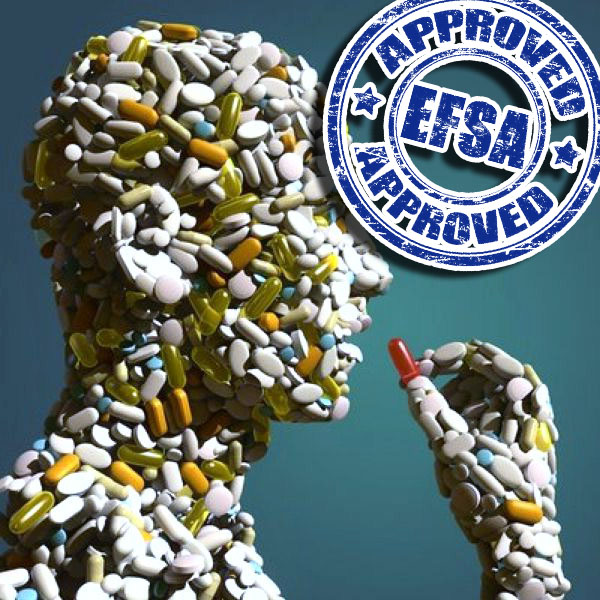 It is very interesting to note that, for decades and with the European Union benediction, the foods destined to animals are consisting more and more of elaborated and technological chemical compounds, that contain the same artificial ingredients, supplements and food additives found in industrial human food: vitamin supplements, minerals, amino acids, fatty acids and fibers, probiotics, enzymes, ... In order that animals swallow these artificial foods, the same strategies that those used for human junk food are employed: food additives like aspartame and glutamate. Products containing natural and artificial sweeteners used to "sweeten foods and disguise the bad taste of certain raw materials and additives (meat and bone meal, canola, minerals, antibiotics, ...)", chemical products increasing artificially the palatability, very concentrated flavors "at the cutting edge of innovation in terms of texture and granulometry of the product", can one read on the web site of a fabricant. "Incomparable resistance to scaling and to time. Moreover, the choice of aromatic molecules is based upon the olfactive preferences of ruminants, to stimulate their intake of feed." (http://www.probiotech.com/fr/produits.html)
It is very interesting to note that, for decades and with the European Union benediction, the foods destined to animals are consisting more and more of elaborated and technological chemical compounds, that contain the same artificial ingredients, supplements and food additives found in industrial human food: vitamin supplements, minerals, amino acids, fatty acids and fibers, probiotics, enzymes, ... In order that animals swallow these artificial foods, the same strategies that those used for human junk food are employed: food additives like aspartame and glutamate. Products containing natural and artificial sweeteners used to "sweeten foods and disguise the bad taste of certain raw materials and additives (meat and bone meal, canola, minerals, antibiotics, ...)", chemical products increasing artificially the palatability, very concentrated flavors "at the cutting edge of innovation in terms of texture and granulometry of the product", can one read on the web site of a fabricant. "Incomparable resistance to scaling and to time. Moreover, the choice of aromatic molecules is based upon the olfactive preferences of ruminants, to stimulate their intake of feed." (http://www.probiotech.com/fr/produits.html)Subjected to the abominable artificial life conditions of industrial production, stuffed with toxic artificial food rendered falsely appetizing in order to "eat more to produce more", livestock animals have the same deficiencies, degenerations and "diseases of civilization" that the ones developing in humans that live in modern societies. Cut from Nature and fed with artificial foods, for animals as much as for humans, the chemical crutches become unavoidable to survive longer. These products, legalized by the European Union, allow to obtain among livestock animals a sufficient survival rate inside the parameters of longevity and productivity that assure the profitability of their production, what justifies financially the hell suffering of their miserable existence.
"The European Union plays a leading role in the amount of [public subsidies] since the direct aids to livestock sector topped a total amount of 3 billion euros in 2009." http://www.demande-subventions.fr/actualites/subventions-aux-eleveurs
B12 vitamin
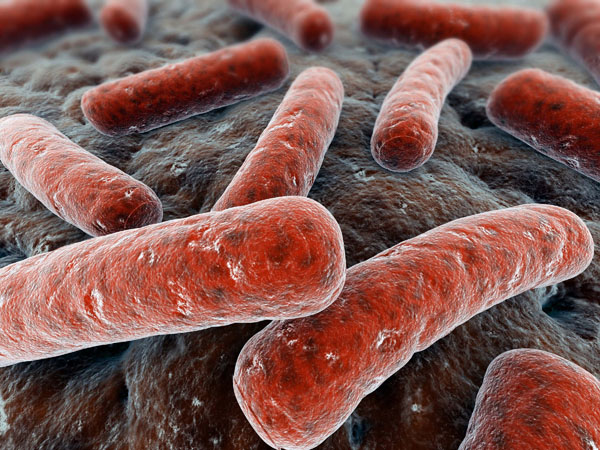 The B12 vitamin, or cobalamin, is a complex molecule made up by over 180 atoms, it is only synthesized by bacterias, under the form of hydroxycobalamin. These bacterias are found almost everywhere in Nature, in soil, humus, over the surface of plants, in seaweeds, fermented products, yeast, gut flora of animals and humans, mucus of the nasopharynx, and thus all these elements contain little amounts of B12 vitamin. On average, B12 is found in far greater quantities in animal products than in plants, because their tissues concentrate the B12 vitamin produced by bacterias that are present in their food, digestive tract and environment.
The B12 vitamin, or cobalamin, is a complex molecule made up by over 180 atoms, it is only synthesized by bacterias, under the form of hydroxycobalamin. These bacterias are found almost everywhere in Nature, in soil, humus, over the surface of plants, in seaweeds, fermented products, yeast, gut flora of animals and humans, mucus of the nasopharynx, and thus all these elements contain little amounts of B12 vitamin. On average, B12 is found in far greater quantities in animal products than in plants, because their tissues concentrate the B12 vitamin produced by bacterias that are present in their food, digestive tract and environment.Natural forms of B12
There are several forms of B12 vitamin found in Nature: hydroxycobalamin, methylcobalamin and adenosylcobalamin.Hydroxycobalamin is the form bacterias produce. It is called the "inactive" form, because it cannot be used directly by metabolic processes of the cells. For being absorbed by the organism, B12 vitamin needs an intrinsic factor secreted by the stomach. Hydroxycobalamin then undergoes a methylation in the gut and inside cells so it becomes usable by cells, it is then called the "active" form: methylcobalamin in cytosol and adenosylcobalamin in mitochondrias. The liver stocks B12 vitamin mostly as adenosylcobalamin, but also as hydroxycobalamin and methylcobalamin.
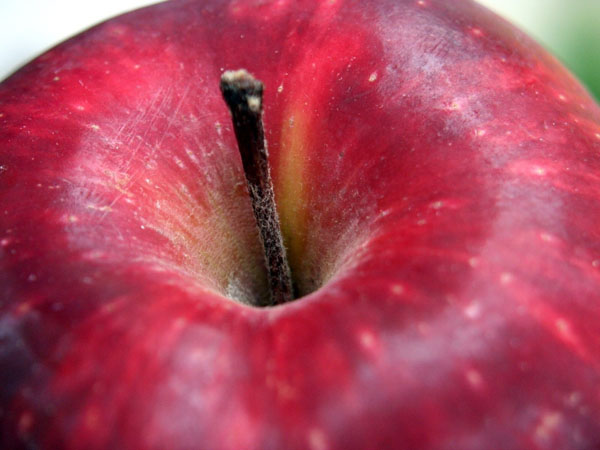 Thus the "inactive" form of B12 is not a "false" B12, it is just the natural form all animals find in Nature. The most common and interesting source of B12 is found in the skin of organic fruits and vegetables, especially in places like near the tail of the apple, or in the upper part of carrots near the tops. Because it also usually contains the major part of minerals, enzymes and vitamins, the skin of organic fruits and vegetables should always be eaten. The air or forests and fields is also loaded with B12-producing bacterias, that will colonize our nasopharynx and our gut flora for our greatest good. It is because of that, among many other reasons, that eating organic fruits and vegetables with their skin and go for a walk in Nature is so good for the health.
Thus the "inactive" form of B12 is not a "false" B12, it is just the natural form all animals find in Nature. The most common and interesting source of B12 is found in the skin of organic fruits and vegetables, especially in places like near the tail of the apple, or in the upper part of carrots near the tops. Because it also usually contains the major part of minerals, enzymes and vitamins, the skin of organic fruits and vegetables should always be eaten. The air or forests and fields is also loaded with B12-producing bacterias, that will colonize our nasopharynx and our gut flora for our greatest good. It is because of that, among many other reasons, that eating organic fruits and vegetables with their skin and go for a walk in Nature is so good for the health. Hydroxycobalamin is transformed inside cells into "active" forms, methyl- and adenosylcobalamin, the so-called "true" B12 found in meat and animal products. Absorb directly the active forms of cobalamin by eating meat is only saving the enzymatic reaction that transforms hydroxycobalamin into methylcobalamin.
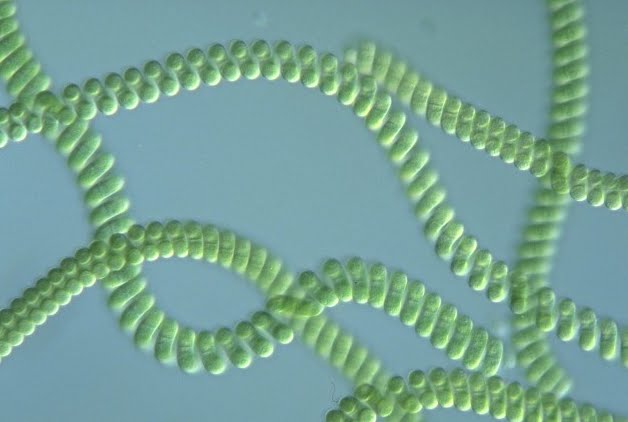 http://www.vitamine-b12.net/formes/
http://www.vitamine-b12.net/formes/http://www.fitforlife.fr/nutrition/micronutriments/vitamine-b12/
Spirulina contains a substance called adeninylcobamid, which is close to cobalamin. It has since a while been qualified as pseudo-B12 vitamin, disqualifying the spirulina as a valid source of B12. Latest research shows that not only adeninylcobamid might be a precursor of methylcobalamin, but also that spirulina contains a non neglectable amount of methylcobalamin, testifying that spirulina is an appreciable source of B12 vitamin.
http://www.natesis.com/spiruline-et-vitamine-b12_le-point-des-recherches-scientifiques,fr,8,121.cfm
Cyanocobalamin
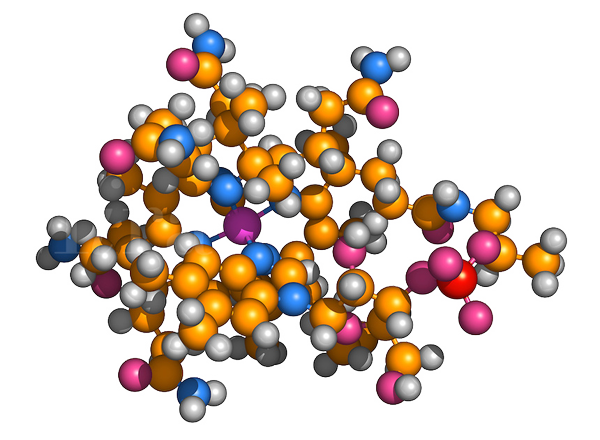 The Vegan Society and most vegan associations recommend an artificial form of B12, that does not exist in Nature: cyanocobalamin. Cyanocobalamin is a waste of human body in case of cyanide intoxication. It's the most stable form of cobalamin, that's why it is used by the industry, thus recommended by the European Union. Cyanocobalamin is industrially produced by fermentation using genetically modified bacterias, then adding potassium cyanide and sodium nitrite. Moreover, dietary supplements that are recommended for instance by the Vegan Society contain 1 gram of refined sugar per serving, flavors probably containing glutamate, and other chemical additives suspected of harmful effects. Just as for the "nutritionism of the 70's", recommendations serve the industry's interests and go against those of consumers.
The Vegan Society and most vegan associations recommend an artificial form of B12, that does not exist in Nature: cyanocobalamin. Cyanocobalamin is a waste of human body in case of cyanide intoxication. It's the most stable form of cobalamin, that's why it is used by the industry, thus recommended by the European Union. Cyanocobalamin is industrially produced by fermentation using genetically modified bacterias, then adding potassium cyanide and sodium nitrite. Moreover, dietary supplements that are recommended for instance by the Vegan Society contain 1 gram of refined sugar per serving, flavors probably containing glutamate, and other chemical additives suspected of harmful effects. Just as for the "nutritionism of the 70's", recommendations serve the industry's interests and go against those of consumers.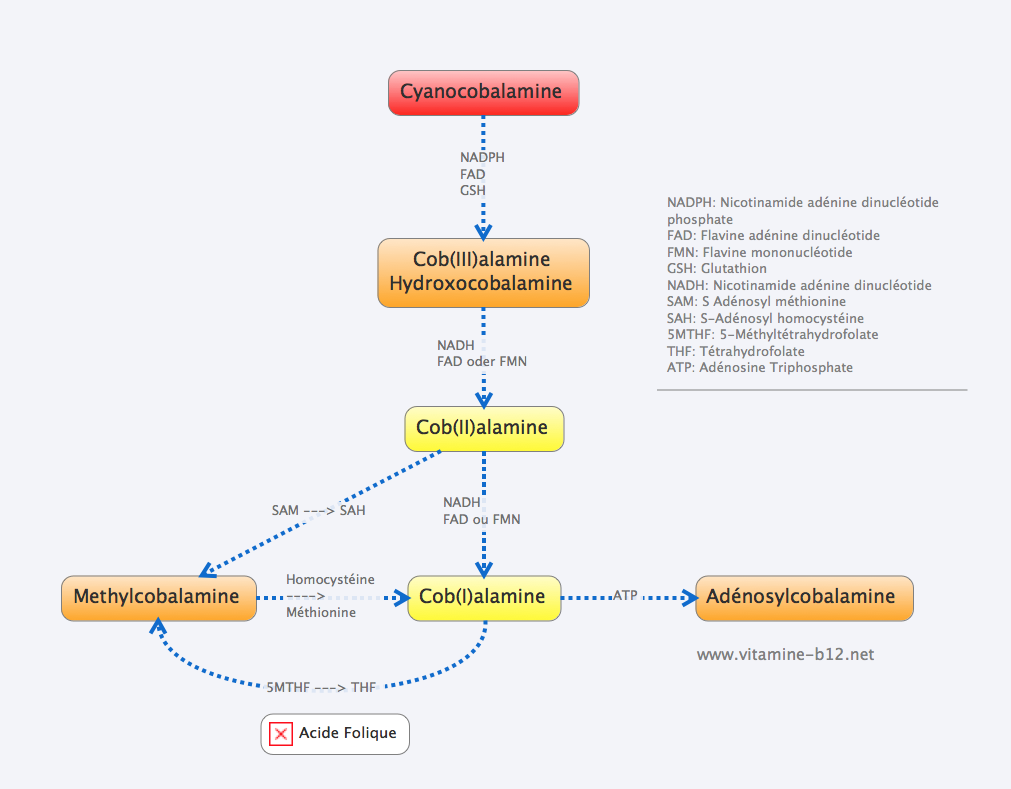 Cyanocobalamin metabolization needs an enzymatic reaction that transforms it into hydroxycobalamin, the notorious "false" natural B12 directly found in plants, that shall then be converted in the "active" form in the same way as for the natural B12 vitamin. This additional enzymatic reaction, required by cyanocobalamin metabolization, consumes a precious molecule of glutathione, a multifunctional antioxidant very useful to the body, and releases a cyanide molecule, a well-known highly toxic poison. The B12 vitamin proposed by the European Union and its followers is "even more false" than the so-called "false" natural B12, but it is also less absorbable and perhaps harmful. Far from being the same natural source of B12 "as for all animals living on this planet", cyanocobalamin is an artificial form that is better to avoid.
Cyanocobalamin metabolization needs an enzymatic reaction that transforms it into hydroxycobalamin, the notorious "false" natural B12 directly found in plants, that shall then be converted in the "active" form in the same way as for the natural B12 vitamin. This additional enzymatic reaction, required by cyanocobalamin metabolization, consumes a precious molecule of glutathione, a multifunctional antioxidant very useful to the body, and releases a cyanide molecule, a well-known highly toxic poison. The B12 vitamin proposed by the European Union and its followers is "even more false" than the so-called "false" natural B12, but it is also less absorbable and perhaps harmful. Far from being the same natural source of B12 "as for all animals living on this planet", cyanocobalamin is an artificial form that is better to avoid.http://www.vitamine-b12.net/complements/
http://www.fitforlife.fr/nutrition/micronutriments/vitamine-b12/
"It can be a disadvantage to use cyanocobalamin in multivitamins and to use cyanocobalamin to fortify human and animal nutrition. It is likely that proteins cannot discriminate between bioactive and inactive B12 [...] Cyanocobalamin is inactive and might occupy the place of B12 vitamin inside enzymes." http://everything.explained.today/Cyanocobalamin
"Intuitively, we understand it is better to choose the forms of B12 vitamin that are as natural as possible, those our body needs the most. Therefore in case of need, it is preferable to choose natural forms in order to fulfill at best the needs of the organism." http://www.vitamine-b12.net/formes/One might prefer dietary supplements of B12 vitamin under the form of methylcobalamin, the form that can be directly used by cells. There exist sublingual 1,000µg tablets, some brands propose supplements without sugar nor too many harmful additives.
Causes of deficiency
If an insufficient intake of B12 vitamin can indeed be a cause of deficiency, it is not the only nor the leading one.The leading causes of B12 vitamin deficiency are:
Infection, irritation, inflammation or stomach disease (intrinsic factor deficiency) or small intestine disease (assimilation problem) like gastritis, Crohn's disease, chronic gastroenteritis, chronic diarrhea, pancreatic diseases. Stomach troubles cause a decrease of intrinsic factor production, or a decrease of acidity causes a devaluation of B12 vitamin and sometimes a complete inability to bind the B12 vitamin to the intrinsic factor. It is the same with small intestine troubles. These can lead to a significant decrease of the ability to assimilate cobalamin (B12 vitamin). Individuals suffering from these gastrointestinal problems are therefore subject to increasing situations of rampant deficiency, even if their diet is rich in B12 vitamin.
Parasites or worm infections: in particular tapeworms are craving for B12 vitamin.
Liver diseases: transportation, assimilation or storage of B12 vitamin problems.
Alcohol and drugs consumption: eliminate alcohol and drugs from our organism requires great amounts of B12 vitamin.
Sugar: it is important to know that metabolizing great amounts of sugar (or any type of carbohydrates) requires great amounts of B12 vitamin.
Pharmaceutical drugs: contraceptive therapy containing estrogen and hormone therapy (PPI Type: proton pump inhibitor), anti-diabetic therapy (Metformin), high blood pressure or heart failure treatments, (ACE: angiotensin-converting enzyme) treatments against cardiac arrhythmia (beta blockers, nitrospray, nitroglycerin), against cholesterol (statin), drugs against erectile dysfunction.
Diet low in B12 vitamin (in particular for vegetarians and vegans).
Eating disorders (anorexia, bulimia, etc.).
Increased needs (uncompensated) in B12 vitamin on special situations (pregnant or breastfeeding women, crisis situation, stress). Stress also includes here oxidative stress (also named nitroxidative or nitrosative) coming from toxic overload, heavy metals intoxication, some treatments, drugs or trauma.
Age: reduced abilities to produce the intrinsic factor and to assimilate B12 vitamin.
http://www.vitamine-b12.net/b12/
Dr. Douglas Graham is a coach for world class athletes, he has been himself an athlete for all his life, and he is a raw food eater since 1978. He has a radically different advice from that of the European Union: for him, the causes of B12 vitamin deficiency are first:
- lack of sun exposure
- environment and artificial life conditions
- antibiotics
- antivitamins found in artificial foods and pollution
- stress
- lack of natural food
- lack of sleep


Deficiencies in B12 and D vitamins are not related to the diet, but to absorption capacities. The needs in B12, the ability to use it and absorb it are greatly influenced by the lifestyle. The ingested amount is not that important. Indeed the deficiency in B12 vitamin is not more widespread among vegetarians, vegans or raw food eaters than in the rest of the population.
In the case of B12 and D vitamin, the food intake is not the determining factor: it's the exposure to the sun. Sunlight is directly responsible for almost all of our D vitamin production, but UV allow to sanitize the skin and to clean the blood, lymph, and intra and extracellular fluids. The activity of many organs and glands is regulated by a moderate sun exposure, just as the production of a number of hormones. Our nutrition is greatly compromised without a such exposure. The sunlight is important for good mood and mental health as much as for our overall nutrition.
B12 vitamin is produced by certain bacterias on the surface of almost all organic fruits and vegetables, in particular in places like near the tail of the apple, or on the upper of the carrots near the tops. These bacterias are also found in the mucus of the nasopharynx and in bowels. B12 vitamin deficiencies, which are present in equal proportions among meat eaters, is the result of a decreased capacity to absorb it. B12 vitamin absorption requires an intrinsic factor, which is a binding glycoprotein secreted by parietal cells of the stomach. Numerous factors can decrease the production of this intrinsic factor, such as the destruction of the cells secreting this glycoprotein, by antibiotics, ulcers, stomach cancer, small intestine diseases, stomach and bowel surgery.
Physical activity is also essential to a good nutrition, it improves the digestion and the ability to absorb and use the nutrients we consume.
Fresh air is a key point of health: oxygen, considered by some as a nutrient in itself, is far less present in urban air, which contains lots of carbon monoxide, particles and carcinogens. These substances act as antivitamins and antinutrients, blocking the availability or the utilization of nutrients inside the cells.
A sufficient intake of clean water, peace of emotions, a sufficiently long and restful sleep are also essential to overall health, by the effect they have on absorption and utilization of nutrients.
The health of the digestive system and gut flora has a direct impact on the correct absorption of the nutrients by the intestines. Antibiotics, radiotherapy, surgery, infections, drugs, pollutants, food additives and artificial food have a very negative impact on the digestion and the correct absorption of foods.
A good nutrition is invariably the result of a healthy life. Food plays an important role into nutrition, but the lifestyle is the critical point. A healthy life brings health, and all the health factors are interrelated and interdependent processes. Everything that get away from a healthy lifestyle provokes symptoms. If you have symptoms, whatever they are, you should better consider correcting your lifestyle, instead trying to treat them.
http://foodnsport.com/blog/Interview-with-Dr-Graham.html
http://foodnsport.com/blog/Nutrition-NOT-Just-About-Food-Part-1.html
https://www.youtube.com/watch?v=M_0GcpVahr8 "Is B12 Deficiency A Vegan Issue? What Is Vitamin B12? (Dr. Graham Q&A Ep. 4)"
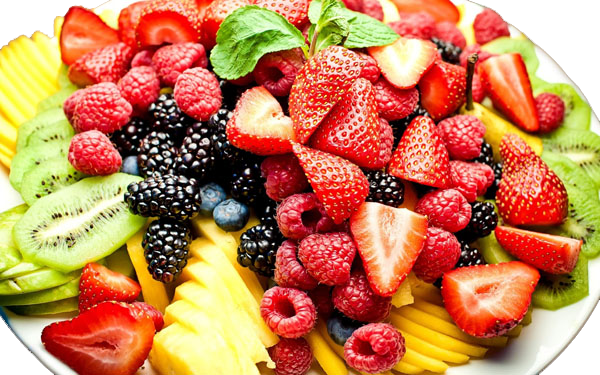 Conclusion seems clear: deficiencies are related to an artificial lifestyle. To prevent B12 vitamin deficiency, it is not the ingested amount that matters, but the lifestyle. Industrial food, drugs, pollutants, lack of sleep, of sun, of physical activity, and a life away from Nature are the direct causes of alarming deficiencies (deficient teenagers in USA: 60% in iron, 57% in A vitamin, 43% in C vitamin, 39% in B1 vitamin, 30% in proteins, 16% in riboflavin, source : Russell Blaylock).
Conclusion seems clear: deficiencies are related to an artificial lifestyle. To prevent B12 vitamin deficiency, it is not the ingested amount that matters, but the lifestyle. Industrial food, drugs, pollutants, lack of sleep, of sun, of physical activity, and a life away from Nature are the direct causes of alarming deficiencies (deficient teenagers in USA: 60% in iron, 57% in A vitamin, 43% in C vitamin, 39% in B1 vitamin, 30% in proteins, 16% in riboflavin, source : Russell Blaylock).Since years, it is necessary to give dietary supplements to livestock animals, that are confined, vaccinated, treated and fed artificially, so that they don't die from their atrocious living conditions, and so that they can arrive to the slaughterhouse in a "legally acceptable" state". We give B12 vitamin under the form of cyanocobalamin to cows, who ignore the taste of green grass and the color of the sky, so that their calves don't die of anemia. And we should take, in our turn, this artificial crutch in order to be able to survive to our wonderful western lifestyle?
You can't stand the TV anymore? Take some Prozac, and you will be able to watch again quietly. If you scratch your eczema, bond your arms in your back, and you will stop scratching yourself. If you are getting sick because you are cut from Nature and Life, take some B12 supplements and don't change anything, your condition will continue to worsen in a tolerable and controlled way.
Are you afraid of being B12 deficient?
There is a simple test advised by Dr Graham to know whether you are deficient in B12 vitamin or not: take a daily tablet of 1,000µg methylcobalamin for 4 to 5 days. If you don't see a noticeable bettering in fatigue, sleep, memory, attention, or mental clarity, then you are not deficient. On the contrary if this is the case, you could do a one month treatment at 1,000µg daily, and thus rebuild the stocks in your liver for years. But above all, reconnect yourself to Nature!
The return to Nature or the supplementation
Vegans without deficiencies prove that eating only natural vegetable food is sufficient, provided you are in good health, in a healthy environment, with a healthy gut flora. Even if science does not exactly understand what is going on on a molecular level, the question of B12 vitamin deficiency clearly shows the need to reconnect the individual to Nature, instead of artificially increasing the ingested B12 amounts. Regularly expose oneself to the sun, eat natural fruits and vegetables with their skin which contains good bacterias, drink clean water, eliminate stress with meditation, relaxation, and some sport in the fresh air of a nice countryside, that's all we really need.Vegans: some exceptions that proves the rule
During the research needed by the redaction of this website, we have tested the levels of B12 vitamin among different vegan profiles, and we noticed some that have not a trace of deficiency in B12 vitamin. These individuals show some remarkable profile similarities we have listed below. These people:
Hypothesis on these exceptional vegans
- Are almost totally raw food eater
- Produce themselves a part of their food
- Have a very healthy lifestyle, and have participated to detoxification programs and fasting periods
- Are involved into physical and spiritual balancing activities, as yoga, meditation, hiking, etc.
These observations on the very small group of vegans that are exceptions to the rule are not based upon scientific approach, but allow nonetheless to emit some hypothesis:
- Theoretically, it is possible that man could have no need for additional B12 vitamin intake.
- B12 vitamin could be produced in sufficient quantities by microorganisms inside our body.
- It requires an impeccable health, especially an intact gut flora.
- This condition depends on the presence of good bacterial strains (probiotics) in balanced proportions.
- This optimal condition is largely favored by a very low stress level (low need in B12), a raw food (basic pH), and a low exposure of the organism to toxins (of the environment).
A difficult conclusion remains. The vast majority of vegans today must take B12 vitamin supplements. The reason for that is probably not that intake amounts are not sufficient, but rather that this diet and lifestyle requires such a degree of reconnection to Nature that it is often unreachable for many individuals.
http://www.vitamine-b12.net/vegan
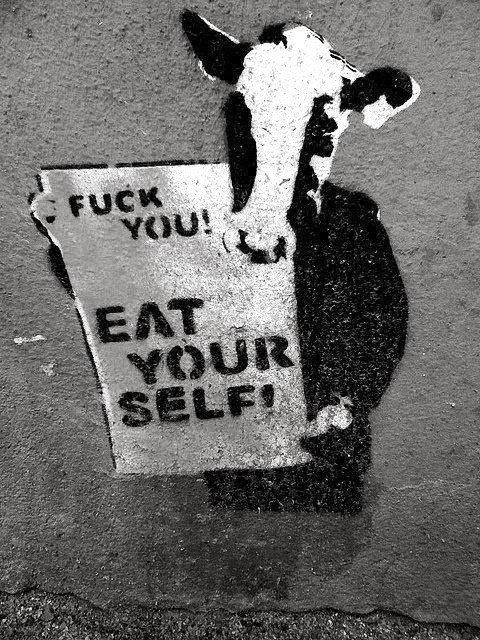 The question of B12 vitamin deficiency is a complex one, but the problem is not where it seems to stand. It's not the consumption or not of animal products that is in cause, it's the lack of natural food, the lack of natural environment, the lack of natural lifestyle. We cannot continue eating animals without totally destroying Nature, that's a fact. But we have also to understand that it's the industry that is killing us, it will not save us.
The question of B12 vitamin deficiency is a complex one, but the problem is not where it seems to stand. It's not the consumption or not of animal products that is in cause, it's the lack of natural food, the lack of natural environment, the lack of natural lifestyle. We cannot continue eating animals without totally destroying Nature, that's a fact. But we have also to understand that it's the industry that is killing us, it will not save us. The numerous damages caused by the various cocktails of artificial molecules that are found in large quantities in the blood of every inhabitant of developed countries and in all the ecosystems of the world clearly show that we must stop producing all these artificial substances, and quickly. The Jean Seignalet's theory shows that these same artificial substances render the organism permeable to numerous unwanted molecules, that largely contribute to causing these famous "diseases of civilization".
The numerous damages caused by the various cocktails of artificial molecules that are found in large quantities in the blood of every inhabitant of developed countries and in all the ecosystems of the world clearly show that we must stop producing all these artificial substances, and quickly. The Jean Seignalet's theory shows that these same artificial substances render the organism permeable to numerous unwanted molecules, that largely contribute to causing these famous "diseases of civilization".We have a choice to make: either continue toward a more and more artificial, sanitized and regulated world, where we eat organic irradiated supermarket apples that come from across the world, we fear bacterias, viruses, microbes, we disinfect constantly our hands with antibacterial gel that destroys the skin and makes it more permeable to bisphenol A, we do monthly blood analysis, we measure and sanitize everything we eat, we continue to not watch the stars, nor feeling the sun over our skin nor the fresh air of countrysides irrigate our body, and we take dietary pills until the end of our days.
 Or we understand that what makes us alive cannot be reduced to an equation nor be synthesized inside a test tube. We actively choose to reconnect ourselves to Nature, to take care of her by taking care of us, by eating local and organic fruits and vegetables, by going regularly into Nature, we take the time and the care to live happily in a healthy and natural environment. Cows are fully healthy when they follow their nature: graze grass and live in fields. And they are sick when confined into our artificial world.
Or we understand that what makes us alive cannot be reduced to an equation nor be synthesized inside a test tube. We actively choose to reconnect ourselves to Nature, to take care of her by taking care of us, by eating local and organic fruits and vegetables, by going regularly into Nature, we take the time and the care to live happily in a healthy and natural environment. Cows are fully healthy when they follow their nature: graze grass and live in fields. And they are sick when confined into our artificial world.We are not made to live inside concrete under light bulbs, eating dead body parts and chemicals packed into colored boxes. We are made to live in Nature, to be friends of animals, and to eat the fruits trees and plants are offering to us. Many individuals as Don José Carmen, "the man who speaks to the plants", show that Life responds to our love, and instead of even more chemicals, this is what the planet, plants, animals and ourselves really enormously need.
| Marc Resch - 121 rue d'Athènes 34000 Montpellier - 06.10.88.29.06 Mentions légales |
|
